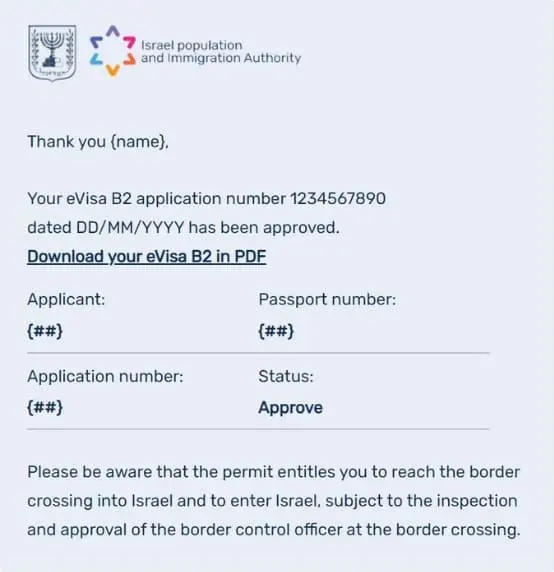After rolling out an electronic travel authorization (ETA-IL) for visa-exempt travelers, Israel continues to digitize its entry procedures with the launch of an electronic visa (eVisa).
Since January 1, 2025, Israel has implemented two new electronic procedures designed to streamline and secure travelers’ entry into the country: the electronic travel authorization (ETA-IL) for visa-exempt visitors and the electronic visa (eVisa) for B2-type visas.
Israel launches the electronic visa
In a pilot phase, the “eVisa-B2” is exclusively available to Indian citizens. This visa category covers tourist visits, family trips, short-term business or non-academic study trips, and stays for medical treatments.
In the future, Israeli authorities plan to expand this service to other nationalities requiring a visa, making access to the country easier for a broader range of travelers.
Last February, Eyal Siso, Director General of the Population and Immigration Authority (PIBA), described the launch of the electronic visa as “a true revolution”, stating that tourists wishing to visit Israel will be able to “manage their application from home and receive their entry visa seamlessly with full accessibility.”
Information and documents required for an Israeli eVisa

The electronic visa application process is conducted entirely online through PIBA’s official portal: israel-entry.piba.gov.il.
Applicants must provide a valid email address, travel details, passport information, personal data, and the following documents:
- A valid passport
- A passport-style photo
- A return ticket
- Health insurance
- Proof of accommodation during the stay
- Evidence of sufficient financial means for the visit
- An invitation letter, if applicable
Once the application is complete and the fee of 100 NIS (approximately €27 / $28) is paid online, visa approval is sent via email within the announced processing time of 10 business days. In certain cases, a visit to the nearest Israeli consulate may be required. The eVisa-B2 is valid for 90 days and permits a maximum stay of 90 days in Israel.
“Obtaining an eVisa-B2 does not constitute a guarantee of entry into Israel. An eVisa-B2 only allows you to reach the border-crossing into Israel, but does not grant you permission to enter or reside in Israel. When you arrive at the border-crossing, you will be checked by a border control officer, who may determine that you are not authorized to enter Israel,” PIBA explains.
ETA-IL is mandatory for visa-exempt travelers to Israel
Simultaneously, Israel officially introduced its “ETA-IL” electronic travel authorization on January 1, 2025, for citizens of 99 visa-exempt countries and territories.
This authorization applies to anyone planning to fly to Israel for short stays of up to 90 days for tourism or business purposes.
Travelers must submit their applications online before departure, ideally between one month and 72 hours before the trip. The ETA-IL is valid for stays of up to 90 days per visit and remains valid for up to two years or until the passport expires.
While it was free during the pilot phase launched in June 2024, the ETA-IL now costs 25 NIS, approximately €7 / $7.
The ETA-IL enables Israeli authorities to pre-screen visitor applications, ensuring smoother entry procedures at the border.








I already applied for an eta-il
Application on Dec. 14.
The number is 1734223852588
The application was sent Dec. 14.
Never got an any approval – only pending.
Please help me out.